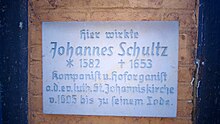Johannes Schultz (composer)
Johannes Schultz (baptized June 26, 1582 in Lüneburg ; buried February 16, 1653 in Dannenberg (Elbe) ) was a German composer . Little is known about his life.
In 1605, at the age of 23, Johannes Schultz accepted a position as organist at the Brunswick-Lüneburg residence and the St. Johannis Church in Dannenberg . He was promoted by Prince August von Wolfenbüttel and his wife. In 1653 he died in poor circumstances.
Works
- 1620 "Forty Neuwe Extraordinary Beautiful Lovely Paduan, Intraden, and Galiard with four voices ..."
- 1621 "Thesaurus musicus, continens Cantiones sacras 3-16 vocum"
- 1622 "Musicalischer Lüstgarte, in it 59 beautiful motets, madrigals, fugues, fantasies, Cantzones, Paduan, intraden, Galliard, Passametz, Täntze etc."
- 1623 wedding motets
- 1645 "Glückselig Fried vnd Freudenreich Musical New Year's Wish"
- "Theutsche Osterhistoria" (lost)
In his early works, Schultz combines old Protestant chorales with the Dutch-Italian motet style. In the "Musicalischen Lüstgarte" he shows a wealth of courtly and bourgeois song and instrumental forms. In his later works he proves to be a contemporary of Heinrich Schütz and Heinrich Albert between the old motet playing and the new society song.
literature
- Robert Siebeck: Johannes Schultz, Princely Braunschweig-Lüneburg organist in Dannenberg - A contribution to the history of music in Lower Saxony in the first half of the 17th century. Century, Leipzig 1913.
Web links
- Works by and about Johannes Schultz in the catalog of the German National Library
- Sheet music and audio files by Johannes Schultz in the International Music Score Library Project
| personal data | |
|---|---|
| SURNAME | Schultz, Johannes |
| BRIEF DESCRIPTION | German composer |
| DATE OF BIRTH | June 26, 1582 |
| PLACE OF BIRTH | Luneburg |
| DATE OF DEATH | February 16, 1653 |
| Place of death | Dannenberg (Elbe) |
